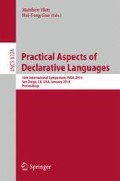Abstract
Program logic can often be structured using abstract computation types such as monoids, monad transformers or applicative functors. Functional programmers use those abstractions directly while main-stream languages often integrate concrete instances as language features – e.g. generators in Python or asynchronous computations in C# 5.0. The question is, is there a sweet spot between convenient, hardwired language features, and an inconvenient but flexible libraries?
F# computation expressions answer this question in the affirmative. Unlike the “do” notation in Haskell, computation expressions are not tied to a single kind of abstraction. They support a wide range of abstractions, depending on what operations are available. F# also provides greater syntactic flexibility leading to a more intuitive syntax, without resorting to full macro-based meta-programming.
We present computation expressions in a principled way, developing a type system that captures the semantics of the calculus. We demonstrate how computation expressions structure well-known abstractions including monoidal list comprehensions, monadic parsers, applicative formlets and asynchronous sequences based on monad transformers.
Access this chapter
Tax calculation will be finalised at checkout
Purchases are for personal use only
Preview
Unable to display preview. Download preview PDF.
References
Bierman, G., Russo, C., Mainland, G., Meijer, E., Torgersen, M.: Pause ’n’ play: formalizing asynchronous C\(^\sharp\). In: Noble, J. (ed.) ECOOP 2012. LNCS, vol. 7313, pp. 233–257. Springer, Heidelberg (2012)
Cooper, E., Lindley, S., Wadler, P., Yallop, J.: The essence of form abstraction. In: Ramalingam, G. (ed.) APLAS 2008. LNCS, vol. 5356, pp. 205–220. Springer, Heidelberg (2008)
Filinski, A.: Representing layered monads. In: POPL, pp. 175–188 (1999)
Filinski, A.: Monads in action. In: POPL, pp. 483–494 (2010)
Giorgidze, G., Grust, T., Schweinsberg, N., Weijers, J.: Bringing back monad comprehensions. In: Haskell Symposium, pp. 13–22 (2011)
Harris, T., Marlow, S., Peyton-Jones, S., Herlihy, M.: Composable memory transactions. In: PPoPP, pp. 48–60 (2005)
HaskellWiki. Listt done right (2012), http://www.haskell.org/haskellwiki/ListT_done_right
HaskellWiki. Monadplus (2012), http://www.haskell.org/haskellwiki/MonadPlus
Krishnamurthi, S.: Artifact evaluation for software conferences (2012), http://cs.brown.edu/~sk/Memos/Conference-Artifact-Evaluation/
Liang, S., Hudak, P., Jones, M.: Monad transformers and modular interpreters. In: POPL (1995)
Lindley, S., Wadler, P., Yallop, J.: Idioms are oblivious, arrows are meticulous, monads are promiscuous. Electron. Notes Theor. Comput. Sci. 229(5) (March 2011)
Lüth, C., Ghani, N.: Proceedings of the Seventh ACM SIGPLAN International Conference on Functional Programming, ICFP, pp. 133–144 (2002)
Mcbride, C., Paterson, R.: Applicative programming with effects. J. Funct. Program. 18(1), 1–13 (2008)
Meijer, E., Beckman, B., Bierman, G.: LINQ: reconciling object, relations and XML in the.NET framework. In: SIGMOD, p. 706 (2006)
Paterson, R.: A new notation for arrows. In: ICFP (2001)
Petricek, T.: Programming with F# asynchronous sequences (2011), http://tomasp.net/blog/async-sequences.aspx
Plotkin, G., Pretnar, M.: Handlers of algebraic effects. In: Castagna, G. (ed.) ESOP 2009. LNCS, vol. 5502, pp. 80–94. Springer, Heidelberg (2009)
Rompf, T., Maier, I., Odersky, M.: Implementing first-class polymorphic delimited continuations by a type-directed selective cps-transform. In: ICFP (2009)
Syme, D., Petricek, T., Lomov, D.: The F# asynchronous programming model. In: Rocha, R., Launchbury, J. (eds.) PADL 2011. LNCS, vol. 6539, pp. 175–189. Springer, Heidelberg (2011)
The F# Software Foundation. F# language specification (2013)
Typesafe Inc. An asynchronous programming facility for scala (2013)
Wadler, P.: Monads for functional programming. In: Jeuring, J., Meijer, E. (eds.) AFP 1995. LNCS, vol. 925, pp. 24–52. Springer, Heidelberg (1995)
Author information
Authors and Affiliations
Editor information
Editors and Affiliations
Rights and permissions
Copyright information
© 2014 Springer International Publishing Switzerland
About this paper
Cite this paper
Petricek, T., Syme, D. (2014). The F# Computation Expression Zoo. In: Flatt, M., Guo, HF. (eds) Practical Aspects of Declarative Languages. PADL 2014. Lecture Notes in Computer Science, vol 8324. Springer, Cham. https://doi.org/10.1007/978-3-319-04132-2_3
Download citation
DOI: https://doi.org/10.1007/978-3-319-04132-2_3
Publisher Name: Springer, Cham
Print ISBN: 978-3-319-04131-5
Online ISBN: 978-3-319-04132-2
eBook Packages: Computer ScienceComputer Science (R0)

